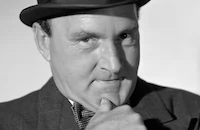The Nanny

Brief Synopsis
Cast & Crew
Seth Holt
Bette Davis
Wendy Craig
Jill Bennett
James Villiers
William Dix
Film Details
Technical Specs

Synopsis
Nanny has always taken care of Virgie Fane and is now in charge of her two children. The elder, Joey, is being released after spending 2 years in a home for disturbed children; Joey was placed in the home because of his implication in the drowning of his sister, but he still maintains that Nanny was responsible. Both Virgie and her husband, Bill, are nervous about Joey returning home, especially Virgie, who depends on Nanny to run the house for her. Joey refuses to have anything to do with Nanny, but no one believes his story except Bobby, the girl upstairs. Bill, a diplomatic courier, is called away on business, and Virgie suffers an attack of food poisoning that forces her to enter a hospital. Aunt Pen, an invalid dependent on heart medicine, comes to take care of the children, and she becomes convinced that Joey is telling the truth when she sees Nanny about to smother him with a pillow. Later, Nanny tries unsuccessfully to drown Joey. When Aunt Pen has a heart attack, Nanny withholds her medicine and tells her story to the dying woman: Joey's sister's death had been a preventable accident for which Nanny was responsible; that, plus the death of her own illegitimate daughter, have caused Nanny to go mad. After Aunt Pen dies, Nanny again tries to kill Joey, but she cannot. Joey and his mother are reunited in the hospital, as Nanny is taken away by the authorities.

Director
Seth Holt
Cast

Bette Davis
Wendy Craig
Jill Bennett
James Villiers
William Dix
Pamela Franklin
Jack Watling
Alfred Burke

Maurice Denham
Nora Gordon
Sandra Power
Harry Fowler
Angharad Aubrey
Crew
Richard Rodney Bennett
Rosemary Burrows
Edward Carrick
Norman Coggs
Charles Crafford
Christopher Dryhurst
George Fowler
Mary Gibson
Renee Glynne
Anthony Hinds
A. W. Lumkin
Philip Martell
James Needs
Kelvin Pike
Jimmy Sangster
Jimmy Sangster
A. G. Scott
Tom Simpson
Tom Smith
Harry Waxman

Videos
Movie Clip



Hosted Intro




Film Details
Technical Specs

Articles
The Nanny (1965) - The Nanny
Greer Garson was the original choice for the lead character but couldn't be coaxed into doing it. Ms. Davis, however, was eager for the work and won the role although director Seth Holt would soon regret the casting decision. "Davis got the flu during shooting," Holt said in a latter interview, "and sometimes she'd stay away altogether, holding up shooting while she sent in day-to-day reports on her condition. When she was on the set, still sniffling and coughing, she was drinking out of everyone's glasses and wheezing in her co-actors' faces in the best show-must-go-on manner. Oh, it was Hell! She was always telling me how to direct. When I did it her way, she was scornful. When I stood up to her, she was hysterical." Co-star Jill Bennett was also intimidated by Davis and said that when she attended a social event with the elderly actress she was instructed to walk behind her like a servant. Davis also gave Bennett some unwanted acting tips during production, particularly in the scene where Bennett is having a heart attack, Davis told her to grab the bedpost like she was "making love to the furniture" (If you see the film, you'll realize Davis' advice was taken to heart).
But not everyone had a combative relationship with Ms. Davis and producer/screenwriter Jimmy Sangster said, "I thought she was the most professional actress I ever worked with." Most film critics also applauded her performance in The Nanny and the reviewer for Time magazine wrote that the film "is her essay on the servant problem, and may be taken as antidote by those who found Mary Poppins too sweet to stomach."
Following The Nanny, Ms. Davis would go on to play a cruel, controlling mother who terrorized her family and sported a variety of colored eye patches in The Anniversary (1968). As for Seth Holt, who suffered from chronic alcoholism, he would die six years later during the filming of Blood from the Mummy's Tomb (1971). Despite a brief career, he turned out some beautifully crafted films, including Scream of Fear (1961) and Station Six-Sahara (1963). Jill Bennett would also die prematurely, a suicide, but she reaped her share of acclaim during her years on the London stage and in occasional movies like The Sheltering Sky (1990), directed by Bernardo Bertolucci.
Director: Seth Holt
Producer: Jimmy Sangster
Screenplay: Jimmy Sangster, based on the novel by Evelyn Piper
Cinematography: Harry Waxman
Editor: Tom Simpson
Production Design: Edward Carrick
Music: Richard Rodney Bennett
Cast: Bette Davis (The Nanny), Wendy Craig (Virgie Fane), Jill Bennett (Aunt Pen), James Villiers (Bill Fane), William Dix (Joey Fane), Pamela Franklin (Bobbie), Maurice Denham (Dr. Beamaster).
BW-94m. Letterboxed. Close captioning.
By Jeff Stafford

The Nanny (1965) - The Nanny
Quotes
Trivia
Notes
Opened in London in November 1965.

Miscellaneous Notes
Released in United States Fall October 27, 1965
Released in United States Fall October 27, 1965













